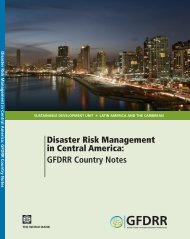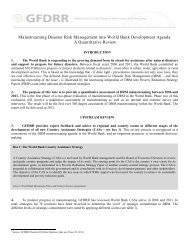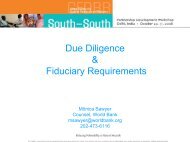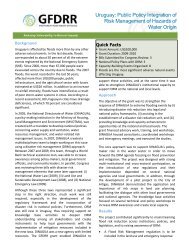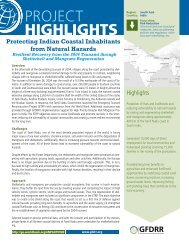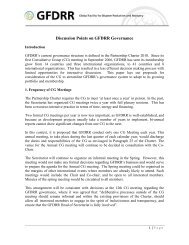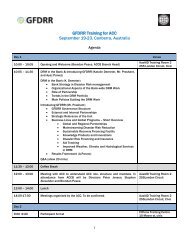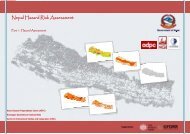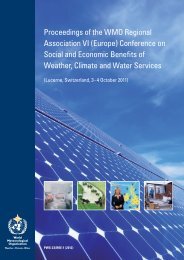El Salvador - GFDRR
El Salvador - GFDRR
El Salvador - GFDRR
You also want an ePaper? Increase the reach of your titles
YUMPU automatically turns print PDFs into web optimized ePapers that Google loves.
IV. ECONOMIC IMPACT | 105<br />
Details on the productive development and social protection strategy are expected to be announced<br />
before the end of the year. The Government’s bet is that planned investment and social protection will<br />
boost activity in 2010. Based on the above, it is expected that the NFPS deficit in 2010, including pensions,<br />
will be around 4.4% of the GDP. In addition, it is expected that the NFPS’s total debt could reach 40% of<br />
the GDP in the same period.<br />
iii) Financial policy. As a response to greater risk aversion by <strong>El</strong> <strong>Salvador</strong>’s commercial banking system,<br />
the granting of credit to the private sector decreased 5% in real terms. The banks took advantage<br />
of available liquidity to reduce their external debt by nearly 50% and to improve their temporary<br />
profile.<br />
iv) Evolution of key variables. Economic activity. With regard to economic activity, first-quarter information<br />
indicates a contraction in nearly all sectors of activity, with the exception of the agricultural and<br />
livestock, financial establishment and government services sectors. The contraction with the greatest<br />
economic impact has been observed in manufacturing and commercial activity, which reflects the<br />
severe contraction in both external and internal demand. Despite this, high-frequency indicators point<br />
to a moderation in the rate of decrease, and thus the GDP in 2009 may drop 2.5%.<br />
With regard to expenditure components, the reduction with the greatest economic impact would be<br />
that of private consumption, which has been affected by the 10% drop in the nominal value of remittances<br />
and by the deterioration in employment conditions. As of August, the number of contributors to<br />
the <strong>Salvador</strong>an Institute of Social Security had been reduced by nearly 20,000 workers, equivalent to a<br />
6.7% decrease. The sector most affected is construction, where the decrease in formal employment totals<br />
nearly 30%.<br />
In turn, a 14.5% drop in gross domestic investment is expected. In addition to the above-described<br />
credit conditions, private investment was affected by the drastic reduction in flows of direct foreign investment<br />
(DFI), which are estimated to have decreased from US$784 million in 2008 to only US$88 million<br />
in 2009. It should be mentioned that there is growing interest on the part of Brazilian investors in taking<br />
advantage of various opportunities stemming from the free-trade agreement signed by Central America,<br />
the Dominican Republic and the United States, with a significant increase in flows of DFI in 2010.<br />
v) Prices, wages and employment. Beginning in the third quarter of 2008, the reduction in international<br />
prices of basic goods gave rise to a sharp slowdown in food and beverages and in transportation<br />
in the Consumer Price Index. The result has been a reduction in interannual inflation, which in fact<br />
has become negative since the third quarter of 2009. Although as of October cumulative inflation is<br />
–0.7%, an upswing is expected in the final months of the year stemming from the comparison with<br />
low price levels observed at the end of 2008. In principle, it is estimated that inflation in 2009 will be<br />
around 1%.<br />
vi) External sector. It is estimated that exports of goods will experience a reduction of approximately 15%.<br />
Two-thirds correspond to the drop in assembly plant (maquila) exports, while one-third corresponds to<br />
the contraction in nontraditional exports, since traditional exports remained at a level similar to that<br />
observed in 2008.





